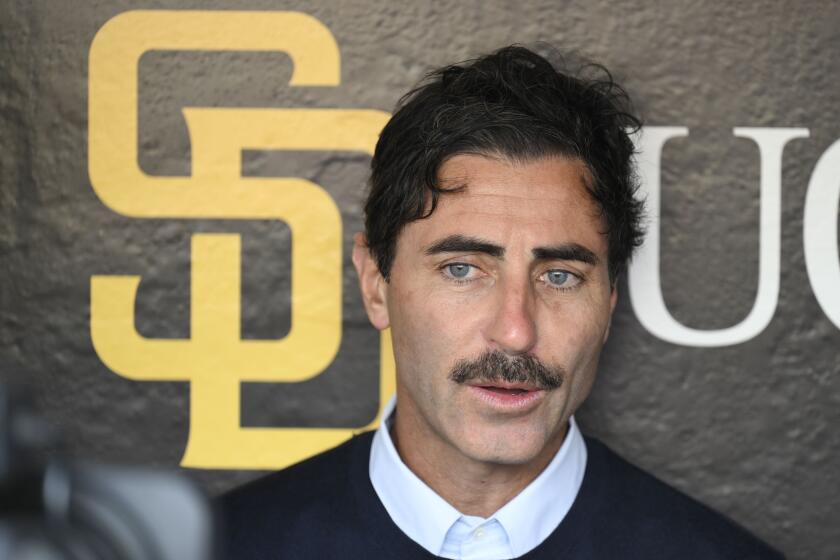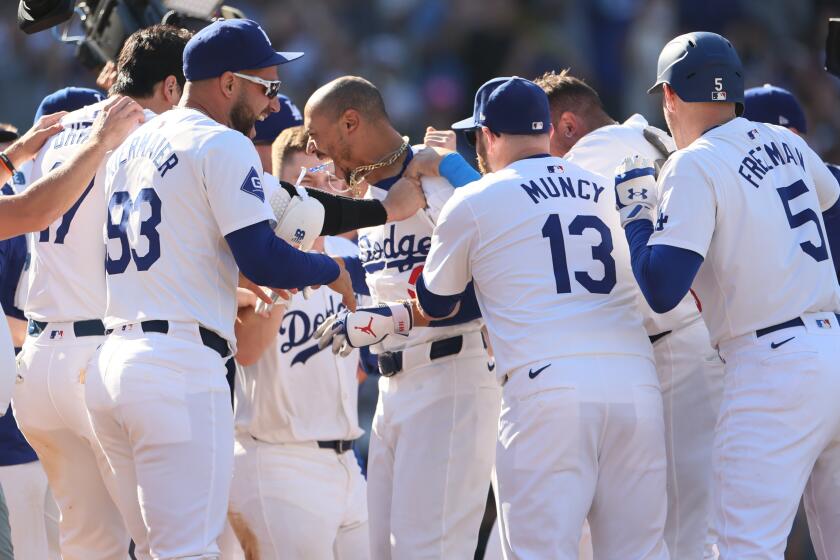Going to the Wall
Covering, as it does, 3.7 million square miles, China ought to be big enough for the Dodgers and the New York Yankees.
Populated, as it is, by more than 1.3 billion people, the country should provide ample opportunity for more than one team to teach baseball and, perhaps, someday reap the benefit of developing a major league player.
Dodgers executives reminded themselves of these points to assuage the irritation they felt when Major League Baseball trumpeted the visit of several Yankees executives to Beijing on Jan. 30 as some sort of groundbreaking venture. The New York Times proclaimed that “Vasco da Gama and Magellan had nothing on” the Yankees’ brass.
It turns out, the Yankees have nothing on the Dodgers, whose relationship with the China Baseball Assn. began in 1980, so long ago that the Yankees lineup at the time included Lou Piniella and the Dodgers’ infield was Garvey, Lopes, Russell and Cey.
Four years later, Dodgers coaches were sent to Kunming, China, for a two-week clinic with the country’s novice coaches, an exchange program that has continued periodically to this day. Four players from the Chinese national team will train this spring with Dodgers minor leaguers at Vero Beach, Fla.
In 1986 -- a year before the Dodgers opened their renowned Campo Las Palmas facility in the Dominican Republic -- team owner Peter O’Malley paid for construction of the first Chinese stadium devoted entirely to baseball. Located 75 miles southeast of Beijing in the coastal city of Tianjin, it is named Dodger Stadium and is home to the Tianjin Lions of the six-team CBA.
“We were trying to spread baseball throughout the world,” said O’Malley, who has remained active promoting baseball internationally since selling the Dodgers in 1998. “Developing the game in China was a natural progression from our efforts in Japan.”
The Dodgers’ Asian presence remains unsurpassed. They have working agreements with teams in the Japanese, Korean and Taiwanese professional leagues, and this spring three players from Taiwan -- pitchers Hong-Chih Kuo and Chin-hui Tsao and shortstop Chin Lung Hu -- and one from Japan, closer Takashi Saito, will be at major league camp.
Tom Lasorda has made dozens of trips to Asia on behalf of the team and owner Frank McCourt has pledged to “continue cultivating those relationships.”
No wonder the Dodgers were privately dismayed when Yankees General Manager Brian Cashman proclaimed at the news conference in Beijing, “You can call this the great push for our industry in China.” The Yankees plan to exchange coaches, scouts and trainers with the Chinese, as well as explore the possibility of opening a baseball academy in the country.
All in all, though, it sounded less like Yankee ingenuity than a Dodger blueprint.
“We’ve been in China a long time, but I would welcome the Yankees too, because if baseball becomes more popular, it’s only going to help the Dodgers,” said Acey Kohrogi, the Dodgers’ director of Asian operations since 1994.
The impetus behind the Yankees’ involvement is the 2008 Beijing Olympics, which Major League Baseball realizes could be its one big chance to sell itself to a Chinese audience. Commissioner Bud Selig plans to help the Chinese prepare by making sure field dimensions are correct and that stadium entertainment systems are up to snuff.
Former big leaguers Jim Lefebvre and Bruce Hurst coach the Chinese national team, which has trained at spring training facilities in Arizona and at Dodger Stadium. Selig is urging several teams to open training academies in China and is contemplating opening the 2008 season in Beijing if the Olympic baseball stadium is ready.
Bringing along the cash-flush Yankees to assist with the investment only makes sense. The Dodgers are willing to help too.
“It shouldn’t be competition, it’s everybody’s game,” McCourt said. “We’ll do whatever we can to work with Major League Baseball to advance the game in China. The Dodgers have always had a privileged role in that.”
At this point, China may be more a marketing opportunity than a talent pool, virgin turf for the Yankees, whose brand already has a global cachet rivaling the Dodgers’.
“Just driving around Beijing, I saw two Yankee hats,” Yankees president Randy Levine said when asked if he had spotted any of his club’s merchandise on the streets. “Oh, and somebody wearing a Yankee sweatshirt.”
That leaves the Yankees with roughly another 1,299,999,997 people to sell their gear to in China. But Levine was careful to put baseball chatter ahead of a marketing pitch.
“Our focus is to get the baseball foundation built first,” he said. “Obviously for baseball, us being the Yankees and people knowing who we are, it’s a great opportunity. I think [the Chinese] are ready to grow. And with that, secondarily, comes merchandising, television. Collaterally, everything is to come.”
No TV deal was cut during the Yankees’ visit. And a lot of specifics remain vague. Cashman talked of “flooding the market with ideas, talent and teachers,” but neither executive could say how many scouts, trainers and coaches the Yankees would send to China.
“As much as 10 people,” Levine said. “We’ll send over as many as we need to, for as long as we need to.”
The Dodgers can attest to the need -- and the challenge. There have been minor victories, beginning with the stadium in Tianjin, the only Chinese city with anything close to baseball fever. Games there draw more than 1,000 spectators -- at least five times the attendance in other CBA cities -- and they mostly cheer and boo at the appropriate times and heckle the umpire when a call is blown.
In 2002, Lasorda threw out the first pitch for the first Chinese professional game at Dodger Stadium in Tianjin, following something of a Dodgers tradition in Asia. O’Malley had thrown out the first pitches for the first professional games in South Korea and Taiwan.
O’Malley estimates he has made more than 100 trips to Asia, beginning with the Brooklyn Dodgers’ month-long, 19-game goodwill trip to Japan in 1956 when his father, Walter, was the team owner. The investment paid off when Japanese pitcher Hideo Nomo signed with the Dodgers in 1995 and became rookie of the year.
“You just don’t build relationships there in a short period of time,” O’Malley said. “Reports on Nomo came from people I’d known since the 1950s and ‘60s. The contacts and friendships that Acey Kohrogi and others have nurtured are critically important as the game develops in China.”
As McCourt begins the fourth year of his ownership, he recognizes the value in maintaining the Dodgers’ high profile worldwide, saying the team cannot take for granted the groundwork laid by his predecessors.
“Part of Peter O’Malley’s legacy is his leadership role in bringing baseball to Asia,” he said. “Something that makes the Dodgers different and special is that, by design or serendipity or both, this is a franchise that has stewarded the game and spread it around the world. We are going to continue to renew and reinvigorate those efforts.
“China is a hugely important nation in so many ways. There are business reasons to be there and baseball reasons to be there. To be frank, we can do better in cultivating that relationship.”
Nobody understands better than O’Malley, who will attend the International Baseball Federation congress meeting March 2-3 in Beijing. Baseball and softball will be dropped as Olympic sports after the Beijing Games, but could win reinstatement as early as 2009 for the 2016 Games. The popularity of those sports in Beijing could be pivotal when the International Olympic Committee takes up the issue.
The lead-up to the Olympics can only raise the visibility of baseball in China. But much work is to be done, be it by the Dodgers, the Yankees or another team willing to devote resources and build relationships.
“It’s good for baseball for any team to be in China,” O’Malley said. “Maybe the Yankees will get the edge on talent like I wanted to do 20 years ago. Maybe it will be the Dodgers. Eventually the efforts will pay off. They’ll be worth a fortune.”
*
Henson reported from Los Angeles and Wallace reported from Tokyo.
bruce.wallace@latimes.com
More to Read
Are you a true-blue fan?
Get our Dodgers Dugout newsletter for insights, news and much more.
You may occasionally receive promotional content from the Los Angeles Times.










